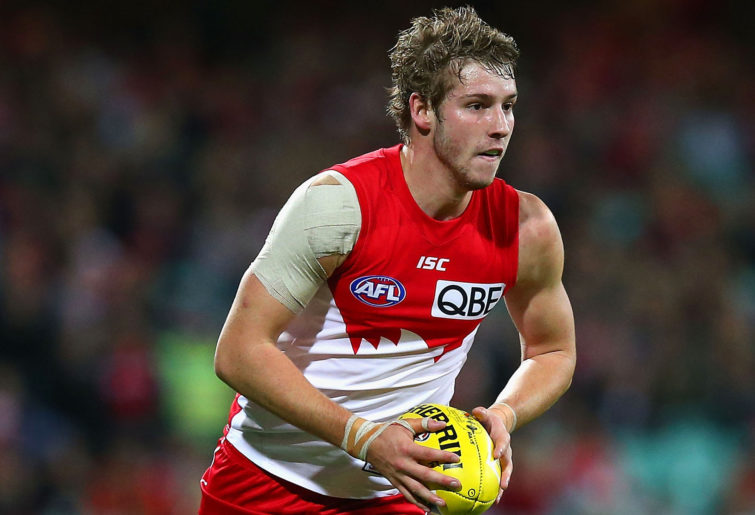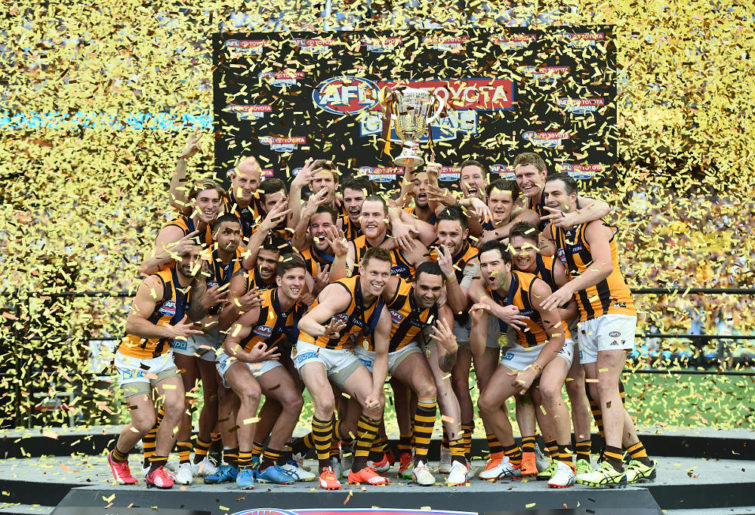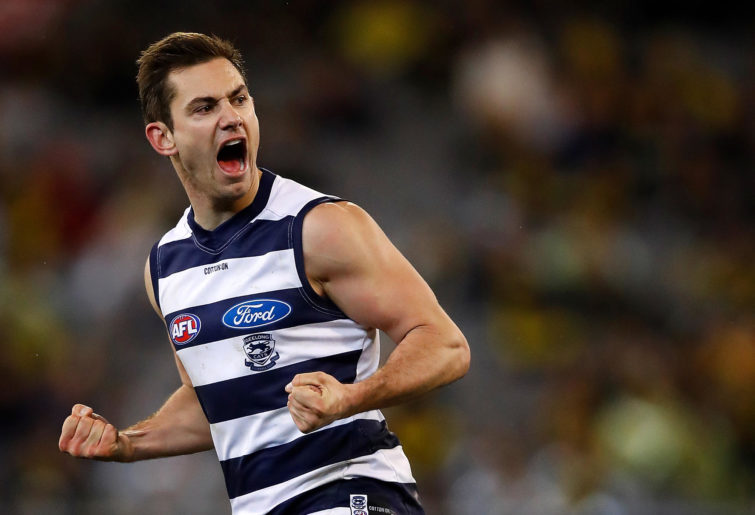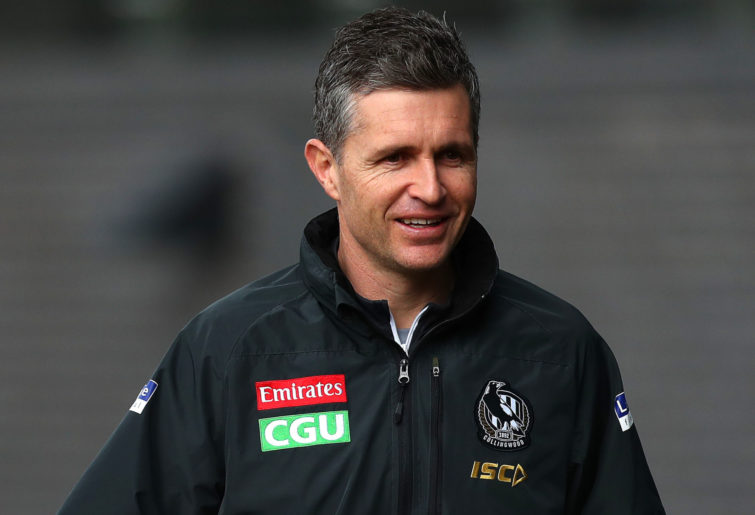The data says Brisbane are a flag contender - but the eye test tells a completely different story
There’s a slight disconnect between the data, the record and the eye test for the Brisbane Lions to start season 2024. This week, Champion…
Opinion
Injuries are a natural part of sport, and for all the positivity and celebration in the AFL, there have been countless players who have had their careers ended through no fault of their own.
Fan-bases often lament the restricted careers of talented players, while pundits in the media often discuss to the potential of injury-prone players.
While the existence of players in the AFL sphere is limited, there is opportunity to celebrate all players for what they were able to produce, and the glimpses of a big future they may have shown.
Below is the ‘what could have been’ team of the century, naming the talented players that may have had long illustrious careers but celebrating what they were able to produce during their time in the AFL.
Alex Johnson
Sydney Swans (2011-2018): 47 games, one goal
Johnson’s return to the AFL in 2018 is unforgettable, as was the final moment of his career, when he ruptured the ACL in his previously uninjured right knee.
At 20 years of age, Johnson had played 45 games and was a premiership player, performing excellently in a role that allowed him to showcase his ever-improving offensive skills out of the back line while maximising his defensive nous.
Johnson had to wait five long years to play again, and his career has acted as an inspiration to many, however it could have been full of accolades.

(Photo by Ryan Pierse/Getty Images)
Justin Clarke
Brisbane Lions (2013-2015): 56 games, one goal
Touted as the future of Brisbane’s defence, Clarke was forced to retire due to concussion after an incident at training in the summer of 2015.
A genuine lock-down defender with a similar no-nonsense approach to the great defenders in a past era, Clarke’s retirement at 22 years of age highlighted the seriousness of concussion issues and assisted in bringing far more attention to head knocks in the AFL.
Nathan Grima
North Melbourne (2009-2015): 86 games, one goal, Essendon (2016): two games, no goals
Had it not been for ultimately debilitating back issues, Grima could’ve been one of North Melbourne’s great defenders of the modern era, with many believing a 200-plus-game career was ahead of him.
Taken as a mature-age rookie, Grima developed into a good, third-tall defender that used his ability to read the flight of the ball to pick up some big numbers.
Grima never played more than 17 games in a season, and his return as a top-up for the Bombers in 2016 was more for leadership and coaching purposes.
Beau Waters
West Coast (2004-2015): 120 games, 25 goals
A first-round pick, Waters is a well known example of a talented player who was severely restricted by serious injuries.
As an excellent rebounding defender with elite foot skills, Waters was rushed into the Eagles’ team immediately in 2004, however osteitis pubis in 2005 started a run of shocking luck.
In the four seasons he managed 20-plus games, Waters was one of the league’s best rebounders and he managed to make the All Australian team in 2012, averaging 21 disposals and seven marks a game.
Waters was struck down by injury once again before retiring, however an excellent performance in the 2006 premiership win and the All Australian honour cemented his legacy.
Matthew Egan
Geelong (2005-2007): 59 games, one goal
Despite being taken as pick 62 in the 2004 national draft, Egan never looked back once he cemented his spot in Geelong best team mid-way through 2005.
Egan quickly cemented himself as a reliable key defender and managed to take some impressive scalps while improving his body work and ability to win the ball rather than purely nullifying.
In a bittersweet end to his career at just 24 years of age, Egan made the All Australian team in Geelong’s premiership year, however the foot injury he suffered in Round 22 forced him to miss the flag and he subsequently never played another game.
Ryan Lonie
Collingwood (2001-2008): 123 games, 61 goals
Once known for his ability to stay on the park, playing 59 consecutive games between 2003 and 2005, Lonie’s career was ultimately cut short due to osteitis pubis, which he had suffered from at the start of his career.
Known by Magpies fans for being a particularly outside player, Lonie’s breakout season came in 2006, when he played all but one game and averaged 18 disposals and five marks a game.
The former halfback had one of the most penetrating kicks in the AFL and was moved further up the ground onto a wing, a role he started to thrive in.
Lonie retired at just 25 years of age after managing just five games in his final two seasons due to the groin issues, preventing him from becoming a key part of a Collingwood midfield that ultimately won the flag two seasons later.
Richard Hadley
Brisbane Lions (2001-2007): 41 games, ten goals, Carlton (2008-2010): 25 games, six goals
Perhaps best known as a trivia answer, Hadley played in Brisbane’s 2003 grand final triumph in just his fourth game.
Hadley was a dominant reserves player in the early parts of his career, however groin issues limited his ability to play senior football until breaking into the premiership team.
Season 2004 was the only year Hadley was able to play consistently at the top level, averaging 13 disposals and three tackles a game through the midfield, however knee issues ended up defining Hadley’s career.
In the 25 games he played at the Blues after being traded cheaply, Hadley was extremely productive in the limited time he was afforded, giving fans glimpses of the smooth-moving ball winner that he once was.
In what may have been an AFL career destined for 200-plus games and security at Brisbane, Hadley retired at 27 years of age after 66 games in ten seasons.
Mark Coughlan
Richmond (2001-2009): 92 games, 39 goals
In a period when Richmond was struggling, the emergence of Coughlan was a beacon of hope that Tigers fans were holding onto.
Winning the Jack Dyer Medal in just his third season, averaging 23 disposals, five tackles, five marks while also polling 16 votes in the Brownlow, Coughlan was on track to become a star midfielder in the AFL.
He played just seven games in 2004 before another strong season in 2005, when Coughlan appeared to cement his spot as an elite young talent at 23.
Coughlan ruptured his ACL against Hawthorn in Round 12 of 2006 and suffered many knee and soft-tissue injuries in his attempts to return to senior football.
After two seasons off, Coughlan played nine games in 2009 including an impressive 28-disposal effort against Port Adelaide, however he was delisted at the end of the season at 27.
Once a player with a strong appetite for the contest with a ball-first mentality, Coughlan was protected in his final season as an outside midfielder.
Xavier Ellis
Hawthorn (2006-2013): 86 games, 28 goals, West Coast Eagles (2014-2016): 34 games, nine goals
As the third pick in the 2005 draft, Ellis got off to a better and far more successful start than both Marc Murphy and Dale Thomas, despite injuries getting a hold of his first season.
Ellis was a star for Hawthorn in the unlikely 2008 premiership, finishing with 28 disposals and 14 marks to cap off an excellent season as one of the brightest young wing men in the competition.
From that point forward, Ellis played 50 games over the next five years at Hawthorn, which included 23 in 2010, as a variety of injuries stunted his growth.
By the time Ellis moved to West Coast, he had settled into a role across halfback and being used regularly as the substitute, allowing him to play 32 games across 2014 and 2015, including the grand final loss to his former team. Ellis retired in 2016 having played just 120 games.

Ellis missed out on the 2015 flag to his old teammates. (AAP Image/Julian Smith)
Brad Fisher
Carlton (2003-2010): 99 games, 127 goals
Fisher may have had some of the best hands in the league, which immediately made him an excellent outlet option for the Blues, as well as a strong target in attack despite being slightly undersized.
With clean kicking skills and a smart footy brain, Fisher’s injuries often came at inopportune times, however he always had an immediate impact upon return to the senior team.
Fisher peaked in 2007, when he kicked 39 goals in 19 games while averaging 14 disposals and seven marks per game, going goalless in just two games for a team that won only four.
At times, Fisher played a role not dissimilar to that of a modern-day Tom Lynch, and was establishing himself as an underrated player throughout the league before falling out of favour in 2009 and suffering a second serious knee injury in 2010.
The Blues delisted Fisher at 26 years of age with 99 games next to his name, after he underwent a LARS knee reconstruction.
Mitch Clark
Brisbane Lions (2006-2011): 82 games, 61 goals, Melbourne (2012-2014): 15 games, 36 goals, Geelong (2015-2016): nine games, 14 goals
While injuries always hampered Clark, a former top-ten pick, he managed to showcase his elite potential by playing all 24 games in 2009 as a ruckman, averaging 16 disposals, six marks and 22 hit-outs per game.
Despite leading the goal-kicking at Brisbane in 2011 and Melbourne in 2012, the AFL was never full able to experience the sheer talent and athleticism of Clark on a consistent basis over a long period of time, which is unfortunate as his ability overhead, on the ground and an incredible running capacity may have made him a dominant figure in the AFL.
While Clark’s career ended with just 106 games, his honesty regarding mental health and openness on the issue has acted as a continued inspiration for players and supporters alike.
Chris Knights
Adelaide (2005-2012): 96 games, 68 goals, Richmond (2013-2015): six games, seven goals
After a big breakout season as a midfielder in 2007 when he averaged 23 disposals, six marks and three inside 50s a game, Knights was perhaps best known for being a dangerous presence in Adelaide’s forward line, stemming from his 2009 season when he kicked 43 goals in 20 games.
An exciting player with strong work ethic and good marking ability, Knights’ injury issues created some doubt about his future at Adelaide having played five games in two of his final three seasons at the club.
Knights’ big move to Richmond at the end of 2012 didn’t work out for player or club, injuring his knee once again and playing just six games in three seasons, unable to get the opportunity to show his ability on the big stage in Melbourne.
Daniel Menzel
Geelong Cats (2010-2018): 73 games, 136 goals, Sydney Swans (2019): seven games, seven goals
Menzel’s story is the epitome of what could have been, as the heir apparent to Steve Johnson required four knee reconstructions throughout his time at Geelong.
The comparison to one of the Cats’ greatest ever medium forwards seemed justified and Cats fans had perhaps seen an improved version of Johnson, with Menzel’s height and marking ability offering him more avenues to being damaging.
After Menzel had finally recovered from his knee issues, when he played just two games between 2012 and 2015, the forward kicked 100 goals in 50 games before being delisted by the Cats due to a lack of tackling pressure.
His move to Sydney lasted a season however the knocks on his game ultimately led to his AFL career being over in 2019.
Perhaps Menzel’s weaknesses may have been irrelevant had he been able to play and be prolific after 2011, however the 29-year-old goes down as one of the unluckiest players in the history of the game.

(Photo by Adam Trafford/AFL Media/Getty Images)
Trent Hentschel
Adelaide Crows (2003-2010): 71 games, 94 goals
By the time Hentschel had four years in the AFL system, he had established himself as the Crows’ premier forward, kicking 42 goals in 19 games in 2006.
A potential decade-long stint under that banner was cut short in Showdown 21, when Hentschel suffered from a torn ACL and dislocated knee cap.
Despite being undersized, Hentschel was smart with his leading patterns and often outworked his opponent to find space, as well as being a good, strong contested mark.
After the sickening knee injury, Hentschel never fully recovered and continued to have issues with his knee after each senior game he played, despite a two-year layoff.
In a time when the Crows could’ve used another presence to assist with the development of Taylor Walker and Kurt Tippett, Hentschel’s injuries were too much and he retired in 2010.
Ashley Hansen
West Coast Eagles (2002-2010): 78 games, 95 goals
A tall presence at 198 centimetres, Hansen’s game was built on a lead-up game rather than strength and contested marking, which resulted in him playing closer to the 50-metre arc than the goal square.
A premiership player, Hansen’s output throughout his career remained consistent despite needing to contend with injuries, which often resulted in a lack of job security.
Often playing at half forward and sending the ball inside 50, Hansen’s best season came in 2007, when he averaged 13 disposals, seven marks and kicked 22 goals in 14 games.
As the Eagles slipped down the ladder and Hansen contended with soft-tissue injuries, it became more apparent that he was more of a structural selection in his heyday, and had he taken the opportunity to move club, perhaps his luck may have changed.
Max Bailey
Hawthorn (2006-2013): 43 games, ten goals
A career spanning eight years resulting in three knee reconstructions, a serious wrist injury and just 43 games ended in the most epic way possible for a ruckman that could have been promising.
Bailey was a highly rated ruck prospect in the 2005 draft, and the high regard he was held in appeared justified in the glimpses we saw in 2011 and 2013.
Unfortunately, Bailey’s continuous struggles with his knees forced an early retirement and a clear lack of output compared to what he could have produced with a clear run at it. Bailey’s tap work was reasonable given the height advantage he had, but his tackling and follow-up stood out, averaging 11 disposals and four tackles in 2011.
Anthony Morabito
Fremantle (2010-2016): 26 games, 14 goals
Powerful, big and athletic, Morabito was the prototypical, modern-age footballer that would have starred in the current game.
An impressive debut season, which included a standout finals performance against Hawthorn, was ultimately followed by just two games as Morabito suffered from three serious knee injuries and ongoing leg issues.
Consistent, decent output in 2010 suggested Morabito was up to the standard of senior football and would have made a mark.
Nathan Foley
Richmond (2004-2015): 154 games, 44 goals
While Foley ended up playing 154 games and putting together a solid career, the midfield bull had the ability to be a match-winner for Richmond in his prime.
Having made the All Australian squad in 2007 upon averaging 24 disposals and four tackles a game, Foley had taken his game to another level just two seasons later when he was averaging 26 disposals and five clearances before leg injuries started to take over.
A tackling machine with plenty of speed to burn, Foley played every game in 2011 but had constant knee and leg issues that limited his impact and as his career wore on, the ailments that begun in 2009 took their toll.
Foley was an underrated part of Richmond’s midfield in the late 2000s, but he stuck around while fighting a degenerative knee injury to act as an elder statesman for the youth.
Jack Trengove
Melbourne (2010-2017): 86 games, 39 goals, Port Adelaide (2018-2019): three games, no goals
A career that looked so promising after two seasons – when Trengove looked to be a strong, tackling presence in Melbourne’s midfield – ended in South Australia with no fanfare.
Yes, Trengove was too young to take control of a football club and the pressure stunted his growth, however the young midfielder managed to tread water before relinquishing the captaincy and offering hope that he could resurrect a stagnating career.
However, Trengove suffered from navicular bone issues that have ended a few careers previously and they ultimately led to the same fate for Trengove.
A pick two, he managed just seven senior games in his final four seasons at the Demons, before becoming a SANFL specialist at Port Adelaide over the past two seasons.
Trengove’s career ended at 26 years of age, thanks largely to the foot injury that dashed any hope of seeing the talented midfielder back at his best.
Justin Longmuir
Fremantle (1999-2007): 139 games, 168 goals
The coach of Fremantle was renowned for his utility status and consistent performances in any role given to him by coaching staff, quickly becoming a fan favourite and well loved in the club.

(Photo by Kelly Defina/Getty Images)
Longmuir’s career was constantly trending upwards, whether he was playing as a forward, second ruckman or in defence in the latter stages.
Athletic and task-oriented, Longmuir’s calmness under pressure made him the ideal player to have in important roles, as he was rarely overawed.
As he started to enter the true prime of his career, Longmuir’s knee caused real issues and it ultimately brought upon an early retirement at 26 years of age, despite no signs of being injury-prone throughout his career.
Jason Porplyzia
Adelaide Crows (2006-2014): 130 games, 181 goals
Often mistaken to be taller than he actually is, Porplyzia was a dangerous presence in Adelaide’s forward line and a good marking target despite being 177 centimetres tall.
Porplyzia was re-drafted as a mature-age recruit by the Crows and made an immediate impact, playing finals in each of his first two seasons.
He backed up his 32 goals in 2008 with an astonishing 57 goals in 2009 and looked well on the way to becoming one of the top small forwards in the competition, however shoulder issues started to become a recurring theme in Porplyzia’s career.
His return to a role higher up the ground in 2012 allowed him to play 22 games and post career-high numbers in disposals, marks and clearances, however this midfield breakout season was ultimately an aberration for Porplyzia, as he ended up needing to fight for his spot in the final two seasons of his career.
Dean Rioli
Essendon (1999-2007): 100 games, 91 goals
Rioli was known for being big-bodied, which may have contributed to his consistent injury issues with his back and knees, but the Bombers got 100 games of class out of their number 43.
Finding himself on a half-forward flank and sometimes higher up the ground, Rioli was excellent with his delivery inside 50 with his elite kicking skills often setting up teammates to score – he averaged a goal assist in each game of his final four seasons at the Bombers.
Had he played closer to goal, Rioli may have averaged two goals a game throughout his career and perhaps experienced greater longevity, as he never played more than 18 games in any of his nine seasons at the Bombers and kicked more than 12 goals on just two occasions.
Rioli’s skills were underrated and his foot skills were a key reason why the Bombers won 64 of his 100 games.